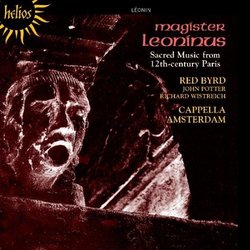A voice teacher and early music fan
George Peabody | Planet Earth | 11/10/2009
(5 out of 5 stars)
"ASCETIC, AUSTERE AND AWESOME SACRED TWELFTH-CENTURY MUSIC FROM PARIS.
One hundred years after late twelfth century polyphony was first written down an anonymous Monk, who may have been from Bury St. Edmonds, wrote an account of it published first in the 19th century. In it he tells about the two most important composers of the fifty years either side of 1200: the 'magestri' Leoninus and Perotinus.
Leoninus, we are told, wrote a cycle of two-part settings of the most important chants in the Liturgical year- Chirstmas, Easter, Assumption and other feasts. This cyle was called 'Magnus liber organi'(the great book of 'organum').
'Organi' of the type that made up Leoninus "Magnus Liber Organi" are settings of the plainsong. This recording includes compositions from the main feasts from the first part of the liturgical year. Although the year starts at the beginning of Advent, the first major feast is Christmas. 'Viderunt Omnes' and 'Alleluya', 'Verse Dies Sanctification' could have been the musical centerpieces of the third Mass on Chrismas Day in the last quarter of the 12th century. The liturgy of Notre Dame was very generous to Easter, and several 'Alleluyas' were set by Leoninus. Red Byrd sing the best of these 'Verse Pascha Nostrum' which is the 'Alleluya' for Christmas Day; the other selections on this disc are related to Pentecost, Ascension and Assumption.
Performing the 'duplum' line in 'organum' is a skill that involves much creativity, and I suspect much guesswork on the part of the performer. In addition, the sustained notes in 'organum duplum' are a challenge to breath control and the sanity of the singer taking part. Fortunately, for our purpose, Red Byrd gives a really enlightened and vocally sound rendition of this music.
Red Byrd believes ' that the point of singing the music of the past is to illuminate the present.' Its constant members are John Potter and Richard Weistreich, who are joined by other singers and instrumentalists who have a strong grounding in early music and an eagerness to explore old and new.
Therefore, I say to you: Go into the most stark and 'spooky' room that you can find (it might help to have some religious symbols, such as a crucifix etc.)and light a candle or several (no electricity please) and simply absorb and enjoy a moment from the past!
This album includes good liner notes with pertinent information and the text in English-Latin."


